Alumni
click here to see profiles about other past HF members!
click here to read about the HF Alums at the 2016 "Living the Liberal Arts" for Honors Forum!
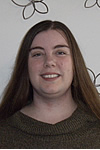
Leah Elliot, Class of 2006
The Honors Forum was never just a set of requirements for me; rather it was a community, and it was a conversation. I spent all my years at Skidmore living in honors housing, literally beginning and ending my days in the Forum. From the first day moving in, our shared membership gave us a bond that other floors lacked. The events specific to our floor, like the annual haunted house, helped us to really know each other and strengthen our community. In honors housing, I was surrounded by people who loved learning as much as I did. This went beyond quiet hours before midterms and finals; it was an atmosphere that encouraged us to discuss our thoughts on lecture topics after class, to keep up with and debate current events, and to share our academic and intellectual discoveries with each other. Whether I researched the intricacies of Japanese gift wrapping or gene transcription, I was but a few steps from others who would share my wonder. A friend's enthusiasm with the latest exhibit at the Tang led me to wander through the galleries. Chance encounters in the hallways led to extensive discussions of political philosophies, our favorite short stories, or even impromptu lessons on Romanian geography. Through the add-on Honors sections to my courses, I engaged in in-depth conversations on topics far outside of my Biology major. I gained the confidence to join in discussions about topics I was not expert on and not to be afraid to ask for the information I lacked. Co-curricular events like the Shades of Gray or Ramsey Lecture series engaged me in conversations with the larger Skidmore community on all kinds of topics. The Honors Forum truly became my forum to discuss, question, and explore any topic I came across. By being a part of the Honors Forum, I developed a habit of discussion, which fed my curiosity across a wide array of disciplines.
This is a habit that I have kept in the years since I graduated from Skidmore College. The year after graduation, I found my intellectual curiosity to be invaluable during the year that I lived and worked in a small Japanese city. Starting conversations about Japanese culture, about the thoughts and experiences of those I met, opened doors into that community. What could have been an isolating experience became liberating and life-changing. As I have worked on my PhD in Biology at Cornell, I have learned how focused research can be, how deeply I can go into a topic. As I have delved into the unknown regions of scientific knowledge, I am aware of how important it is to explore everything and how conversations and discussions can unveil unexpected but important connections between seemingly unrelated topics. Getting another perspective can provide the solutions that elude me or suggest new and exciting questions to study. I believe that I developed the drive to share my curiosities and to engage with others in the Honors Forum, and this drive will carry me throughout my life, no matter what I do.
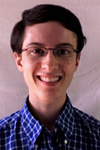
Adam Epstein, Class of 2008
During my time at Skidmore College (and what a time it was!), I was the primary author
of the Service Requirement requirement for the Honors Forum and served as the HF's
first Service Requirement Coordinator for the last two years of my college career.
During my senior year, I also served as the HF Vice President. Throughout the course
of my first two years as an HF student at Skidmore, I grew to believe that HF students
(if not all students) had a duty to use their academic gifts to promote the welfare
of local and/or global communities. I believed--and continue to believe--that an honor
appended to one's name, resume, or degree only has value insofar as it represents
a skill, proclivity, or talent that can be put into practice to contribute to society
in a positive way. Thus, I, with the support of fellow students and faculty, created
the Service Requirement requirement in order to encourage HF students to find creative
ways to turn their academic work into positive community service. In so doing, I was
simultaneously attempting to echo Lucy Scribner's concept of "mind and hand"--that
is, the balance of thoughtful, private study of theory/philosophy (mind) with the
practical applications of such work (hand). The former means nothing without the latter.
I believe that the Citizenship requirement successfully promoted a number of excellent
projects during my college career that students may have never undertaken otherwise:
a children's creative writing workshop, a film showing and panel discussion on the
future of electric cars, local (and free) musical performances, social justice efforts,
voluntarism at medical and nursing facilities, the creation of useful databases for
HF students, the creation of a nutritional information system for dining services,
etc. I see on the website that new projects continue to take form, and I am proud
that this legacy live on in the HF.
Having graduated over four years ago, I still try to live the value of "mind and
hand." After finishing my BA in Religious Studies and South Asian Studies at Skidmore,
I earned a Master of Music degree at The Boston Conservatory. Now, I am a licensed,
professional public school music educator in the Somerville, MA Public School district.
In my job, I constantly have to stay in tune with the latest research in my field
and think very deeply about curriculum and educational philosophy. At the same time,
I need to be able to put those big ideas into direct practice by designing and implementing
quality lessons for my students at every level. My Skidmore and HF education acted
as great practice for this kind of thinking. Creative thought DOES matter, it turns
out. In addition, while an HF member at Skidmore, I felt encouraged to pursue my interests
and goals, no matter how difficult they might have seemed. The independent studies
I did and co-curricular events I designed with HF support were particularly useful
in this regard. When I came to the HF with an idea, the answer was always, "cool,
how can we support you?" This positive attitude of finding ways to make my interests
and motivations a reality has been a great model for me to continue to do this in
my professional life and also to find work settings where that kind of attitude is
the norm. I am honored to have been an HF member during my time at Skidmore College.
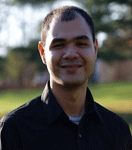
Jessada Mahatthananchai, Class of 2009
For me, HF experience has been an enriching one. I was a chemistry major/english minor at Skidmore so I was interested in the humanity side of science. Luckily through HF independent study and citizenship project, with the support of Prof. Giguere at the chemistry department, I helped in assembling a museum exhibition “Molecules That Matter,” which showcased the top ten molecules of the 20th century that changed the course of humanity. The exhibition at the Tang Museum and later at the Chemical Heritage Foundation recounted the amazing stories of molecules such as aspirin, DDT, progestin, and DNA. Here I learned to communicate my passion in science to the public by being a “tour guide” at the exhibition and creating a preliminary website prior to the opening of the exhibition. I had also taken several HF courses in chemistry and math, which are more demanding and challenging but satisfying to my desire to learn more. In addition to that, I had a great time with Prof. Catherine Golden during a travel seminar (an HF course) on the topic of Jane Austen in Bath, England. These opportunities truly made my Skidmore experience unique and truly interdisciplinary. And this is exactly what I had expected when I joined the HF! HF really did "add more to my Skidmore," as I once heard. In term of my current career path, what HF instilled in me is the desire to challenge myself. This was what led me to pursue a graduate degree in chemistry, in which I started at University of Pennsylvania. What I didn't foresee was that I would be moving to Europe to continue my doctoral degree, which I was very uncertain in the beginning. But in the end I moved to my current position as doctoral student in Switzerland in large part due to the HF experience that taught me not to fear new circumstance in life and to excel in any new situation.
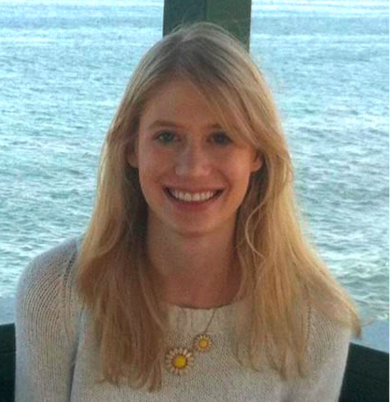
Annie Potish, Class of 2011
At Skidmore, there’s so much emphasis on learning as a rewarding process in itself, rather than as a means of securing a degree or satisfying requirements. I was encouraged to take classes that challenged me and opened my mind, and I try to keep that sense of inquiry with me today. I’ve always loved reading and writing, and my work allows me to share that passion every day with young people. There’s something amazing about seeing my students grapple with a text’s meaning, express themselves powerfully through writing, or simply learn about themselves and the world around them.
The English department at Skidmore is absolutely incredible, and my positive experiences in those classes definitely contributed to my desire to teach English; I am currently a middle school English Teacher at a charter school in the South Bronx in New York City. Being a Head Tutor at Skidmore’s Writing Center further solidified my passion for education, where dedication, inquisitiveness, and enthusiasm go a long way. Problem-solving and willingness to try new things are also important, as well as communication and organization skills.
My advice is that while you’re at Skidmore, take classes that interest and excite you throughout your four years—not just when you’re fulfilling your liberal arts requirements. This may sound straightforward, but I think it can be easy to get caught up in requirements or classes you feel you “should” take. I love English and history, but while I was at Skidmore, I found myself unexpectedly interested in psychology classes. These classes didn’t count towards my major or minor, but they inspired me to think in new ways and enhanced my overall college experience.
I still see how much creative thought matters every day of my career. Whether I’m planning out an entire unit or a short-term project, it’s so important for me to be as creative and purposeful as possible. Creativity leads to student engagement. When students are engaged, they put in the most effort and show the most academic growth. As an educator, it’s my responsibility to foster creativity in my students, which means taking a look at how creative I’m being myself.
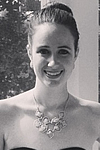
Phoebe Pundyk, Class of 2012
Phoebe Pundyk is a Skidmore graduate. She is currently an Assistant of Advertising
and Promotions at the New York City Ballet. At Skidmore, she was a Studio Art Major,
Business and Honors Forum minor. Here are a few words from Phoebe herself.
I work in the Marketing Department at the New York City Ballet, whose summer home
is the Saratoga Springs Performing Arts Center, a stage I proudly walked across not
too long ago. My job requires innovative critical thinking, teamwork, and creativity.
Skidmore and participation in the Honors Forum were key to building a strong work
ethic that I maintain each day in this intellectually challenging environment. Similar
to the creative environment at Skidmore, I feel fortunate to be able to spend my days
at Lincoln Center, a place that is bursting with ingenuity and artistry.
The highlights of my coursework at Skidmore were most certainly the Honors Forum classes
that I took. I fulfilled many HF course requirements through one-credit add on classes
to an existing course. Rather than settling for a course that I was less interested
in, I was able to work with the professor and often a smaller group of like-minded
students to learn about a specific topic. This customizable curriculum allowed me
to dive deeper into subjects of interest. This encouraged me to follow my curiosity.
At Lincoln Center I follow a similar path, one that is familiar to me and manageable
as a result of my time at Skidmore.
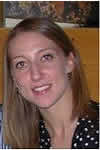
Melissa Rampelli, Class of 2006. Doctoral Fellow and Adjunct Professor of Literature at St. John’s University
The Honors Forum would not have made its indelible mark had it just been about getting a 3.4 GPA and having one’s name printed on a list. For me, HF came to be about a sense of community, engagement in an intellectual life outside of the classroom, and new challenges. By living on the Honors Floor in, then, Weicking Hall and attending the HF events—Shades of Gray, Fridays @ 4, field trips—I found friends within a community of likeminded learners. And the plethora of these academic lectures and discussions organized by the HF—often outside my own discipline—encouraged me to have a life of the mind outside of my English Literature novels and gave me the opportunities to do so (a daunting pursuit to shape on one’s own at that age!).
But what most characterizes the Honors Forum as having left an “indelible” mark were the new challenges it allowed me to tackle. Two rigorous seminar and practicum experiences—Dr. Boshoff’s ENG303H “Peer Tutoring Project” and Dr. Golden’s HF201 “Junior Great Books”—confirmed my desire to teach secondary English and earn an MAT at Brown University; writing my Senior Thesis and presenting this work at the Academic Festival offered a graduate-level experience in a supportive undergraduate setting and shaped the doctoral research I would come to do six years later.
We often learn to swim in the winter and ski in the summer; and so it goes, through reflection, I have come to see that the qualities the HF initially set out to foster—self-initiative and a willingness to be in dialogue—are those I’ve come to value in myself and my students.
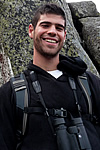
David Steinberger, Class of 2009
When I arrived at Skidmore College, I knew that I wanted to be challenged intellectually,
but I also knew that I wanted to connect with my community. As a native of the Saratoga
region, I had a strong connection with the surrounding area and had engaged in numerous
community-based projects in Middle and High School. I wanted to continue this service
in college, and the Honors Forum provided me with the perfect outlet for my ambitions.
With its core focus on connecting highly rigorous academics with community-based outreach
and leadership, the Honors Forum was a natural outlet for my passion.
Within my first year in the Honors Forum, I began my community service by embarking
on my Service Requirement. As an avid birder studying biology and ornithology at
Skidmore, I wanted to share my knowledge and passion of birds with others, and contribute
to science through the process. I was able to do this by organizing the Great Backyard
Bird Count, a citizen science-based initiative founded by the Cornell Lab of Ornithology
aimed at engaging everyday people with bird counting, while simultaneously helping
conservation scientists. Participants count birds in their backyards and neighborhoods,
and submit their results to the Lab of Ornithology for analysis, where ornithologists
track the movement and population shifts of various wintering bird species. As the
leader of this event at Skidmore, I was able to get several of my peers and community
members interested in bird watching and conservation, and I continued to conduct this
count and numerous other community-based bird walks and lectures throughout the rest
of my undergraduate career.
In addition to providing me with a community-minded outlet for my undergraduate endeavors,
the Honors Forum challenged me intellectually at a level that I would not have received
otherwise in my undergraduate studies. My honors-level classes demanded the highest
level of dedication in my studies, challenged my viewpoints, and demanded that I think
critically and innovatively. Vigorous discussions and debates were a daily staple
in these classes, as well as highly structured and insightful presentations and literary
compositions. I owe a great amount of my academic and professional abilities today
to the time spent in my honors classes. And my serve as Trip Coordinator and Vice
President on the Honors Forum Committee taught me the invaluable skills of teamwork,
compromise, planning, and organization. All of these skills have proven invaluable
in my post-Skidmore life, including the numerous collaborative projects required of
me in graduate school, and the daily management, teamwork, documentation, and organizational
skills needed in my current occupation as an assistant at an environmental consultant
and management firm.